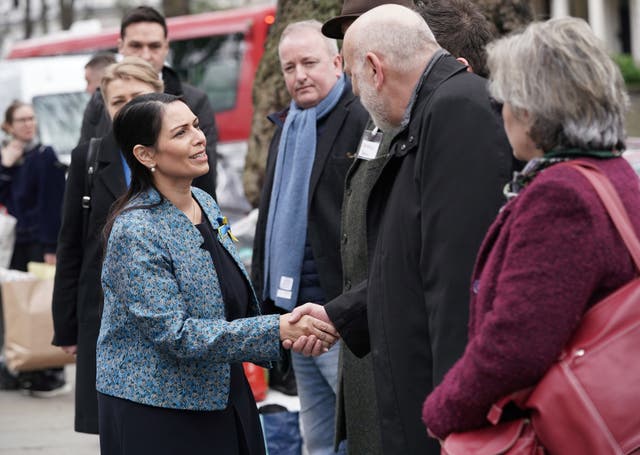Moscow’s announcement of limited ceasefires and the creation of humanitarian escape routes out of Ukraine appears “cynical beyond words” because it would only allow refugees to head to Russia and Belarus.
Foreign Office minister James Cleverly said the routes set up were “nonsense” because they would take fleeing Ukrainians “into the arms of the country that is currently destroying yours”.
Russian forces continued their bombardment of Ukraine’s towns and cities despite the announcement of limited local ceasefires.
Previous attempts to create humanitarian corridors have ended with civilians being shelled as they tried to flee to safety.

But evacuation routes published by Russia’s RIA Novosti news agency showed that civilians will only be able to leave to Russia and Belarus.
Mr Cleverly told the BBC: “It appears cynical beyond belief. There is a view that Vladimir Putin believed there was a widespread desire of Ukrainians to be closer to Russia, to be more Russian. I think that has been proven to be a complete nonsense by the circumstances we are seeing.

He added that “ultimately the most humanitarian thing the Russians could do is end this completely illegal, completely unjustified invasion of Ukraine”.
Meanwhile ministers were scrambling to go “faster and harder” with sanctions levelled against the Kremlin.
The Prime Minister is expected to put more pressure on international leaders to take further action to remove Russia from the Swift payment system, while pushing them to back his six-point plan to tackle Russian aggression.
Latest Defence Intelligence update on the situation in Ukraine – 07 March 2022
Find out more about the UK government’s response: https://t.co/D3NG9b9zMX
?? #StandWithUkraine ?? pic.twitter.com/lIjezjELsE
— Ministry of Defence ?? (@DefenceHQ) March 7, 2022
Meanwhile, Foreign Secretary Liz Truss said amendments to the Economic Crime Bill – which is set to be fast-tracked through all stages in the Commons on Monday – would “give us the chance to bring even more crippling sanctions against Putin and his regime”.
Labour said the legislation still gave Russian oligarchs a “get-out-of-London-free” card even though the grace period under the measures designed to tackle so-called “dirty money” has been cut from 18 months to six, with the opposition calling for this to be reduced further to just 28 days.
Mr Cleverly told Sky News the Government was working on a cross-party basis to get the legislation through.
“The ultimate goal is to make sure that the sanctions that we’ve already put in place, which are incredibly effective, and have had a real impact on Russian oligarchs, and indeed the Russian economy, are made even stronger still, and we welcome cross-party support in that.”
In response to criticism over the numbers of individual oligarchs targeted by sanctions, Mr Cleverly said: “We’ve had a very wide-ranging number, over 200 individuals and entities, over £250 billion worth of Russian economic activity curtailed, over three million Russian companies no longer able to raise finance on the London market.
“So, the fact that Vladimir Putin singled us out for criticism is a badge of honour.”

“I think the reasonableness of this period is what will give us the chance to do that.”
The Government was also pressed to do more to allow Ukrainians fleeing the war to enter the UK.
The Home Office revealed on Sunday that only “around 50” visas had been granted under the Ukraine Family Scheme as of 10am on Sunday.
Shadow home secretary Yvette Cooper tweeted: “This is too slow. Too many hoops for desperate families to have to jump through. Home Office completely failing to understand urgency of crisis.”

Mr Cleverly said the number of Ukrainians being granted visas for the UK would increase “very, very quickly” but the scale of the crisis was unprecedented.
“This is the largest refugee flow that we have seen since the Second World War,” he told LBC.
The Home Office “had to create a system pretty much from scratch”, he said, and the process “will get quicker and slicker and faster”.






